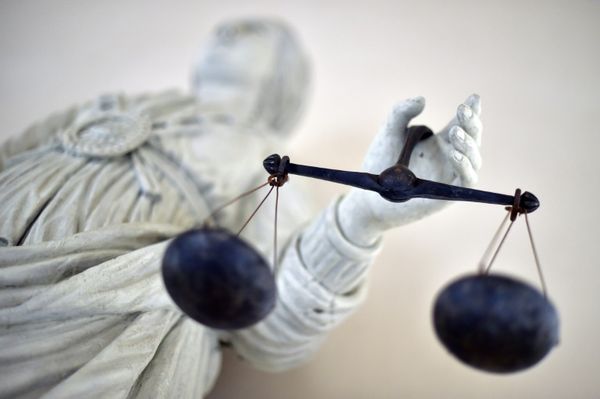At a glance, it looks like another glamorous catwalk show, complete with glitter and pyrotechnics.
But the Kimberley Girl program is about something much grittier and more meaningful.
"A huge percentage of the girls who come into the program have awful stories — stories of trauma," founder Kira Fong says.
"It's about helping them expel those demons and push forward, to be the best they can be."
The program started in 2004 with the aim of developing leadership skills and resilience in young Indigenous women.
The finalists undertake two weeks of workshops covering goal setting, job pathways, nutrition, coping skills, and sensitive subjects like self-harm.
And then there's the glamour side of things. Each girl has a photo shoot and takes to the stage for a public performance, including a catwalk appearance and live, on-microphone interviews.
Kira Fong, who was born and bred in the Kimberley town of Broome, came up with the concept after her international modelling career wrapped up.
"As a young woman from a minority racial group in Australia, I know that I suffered from a lack of self-confidence, and was very self-conscious about my skin colour and the way my eyes looked.
"So we are trying to make sure these young women can believe in themselves, support each other, and start to map out a plan for the future."
The Kimberley Girl program has since expanded to the culturally rich regions of the Pilbara and Goldfields.
The young women who participate are from far-flung mining towns and Aboriginal communities scattered across northern WA.
Their stories are confronting and rarely told, with common themes of family loyalty, racism, and a yearning for opportunities rarely available close to home.
Three of the finalists from recent years shared their stories with 7.30 below.
Kassie Hunter-Aragu, 2020 Pilbara Girl winner
"Before I did Pilbara Girl, I was in a bad place. I was heavy on drugs, and struggling with my mental health. I just felt so alone and the drugs were like a bandaid, trying to cover up my pain.
"It got to the point that Child Protection were getting involved, and I was worried I was going to lose my kids.
"I couldn't see a way out. People would tell me, 'You're too far gone,' and I believed them. I thought, 'Yep, this is my life. This is the way it's always going to be.'
"I hate to say it, but I think I would have been dead if I hadn't done Pilbara Girl.
"It was a tough time and I had tried to commit suicide — I don't think I would have made it out at all.
"In the end, I had to be sedated and flown down to Graylands (a psychiatric hospital in Perth). I hate to say it, but it was the right place for me to be. At first, when I woke up, I panicked. But it helped me reset.
"It gave me something to look forward to. I thought, 'I've got to learn to love myself and look after myself.'
"Before I did Pilbara Girl, I'd never worn dresses, no high heels. I've always been a tomboy. But it was fun and I started to enjoy being who I am.
"Once I made the finals, I knew I needed to turn my life around. I had to keep making the right choices. And then when I won, it was so exciting. I was an ambassador [now], and I had to stay on the right path.
"Life is totally different now. I work for FMG (Fortescue Metals Group) at an iron ore mine, which is exciting. I've finished my six-month probation and I really like it.
"And my kids are doing great. They are happy and healthy, and I'm doing the right thing for them.
"Just hearing them saying 'I love you' means everything to me."
Kahlia Rogers, 2021 Kimberley Girl winner
"I am from the Wangkatjungka community, which is a small community with about 250 [people] in the central Kimberley.
"It was really good growing up there because you're around friends and family all the time, and it's good being out bush because it really clears the mind. You can go fishing down at the river. It's a good place to heal and refresh.
"I want to be a role model to the young girls back home.
"I feel like the shame factor is really strong with young Indigenous girls. I used to be like that. I was a really shy, ashamed kid.
"By doing Kimberley Girl, I took the risk to step out of my shell and be a better version of myself.
"It meant a lot to me to have my mum and my family there watching the finals show. They had to travel a long way.
"I lost my dad a few years ago. It had a big effect on my life. It brought me down for a while, but I knew I had to keep pushing on.
"It's been hard. You don't ever really get through the grief. I think you just learn to live with it. But I think he'd be proud of me.
"I went to a boarding school in Melbourne and now I work as a mentor to students at the Yiramalay school up here in the Kimberley. I've also done a bit of modelling and I have an agent, but COVID-19 has put that on hold for a while.
"My message to Indigenous girls would be that you can be whatever you want to be.
Tori Jacobs, 2021 Pilbara Girl finalist
"I'm a very outspoken person – too outspoken at times. But I can also be a bit shy. That's why I wanted to do Kimberley Girl, to be more confident. It's a big thing to be able to get out of your comfort zone.
"Me and my family have fostered children for as long as I can remember. We do respite for kids in care and we have two little boys that we foster full time.
"It is pretty full on sometimes, but they are part of our family now and they call me tidda (sister).
"I work in child care and I'm really passionate about it. My mum and I would like to open our own childcare centre in Karratha one day, one that can offer some health services and counselling to families as well.
"Parents are under a lot of stress and we'd love to find a way to help families.
"It's hard though at the moment because my mum has to be on dialysis and there's no available treatment for her in Karratha.
"There are no nurses available to operate the dialysis machines. So my mum's had to be in Perth for 10 months. And soon I'll be going down to Perth to train in dialysis care so that hopefully she can come back to Pilbara and I can care for her at home.
"It's been very tough. My dad has to work a lot. And I can't leave home yet and start my own life because I have to help keep things together while Mum's away. I'm hoping to start a petition to try to get some more resources up here in Karratha.
"There's a lot of self-doubt, and they don't ask for help. I've been in that situation. Sometimes it's hard to trust people.
"But I feel good now. I feel confident. And now I've got these jijas (sisters) for life!"
Watch this story on 7.30 tonight on ABC TV and ABC iview.







